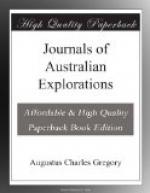NAEXPDN AUG 30 1856 DIG2YDN
and buried a tin canister with letters, stating that the exploring party was to start the following morning for Moreton Bay, and instructing Mr. Baines to remain at the Albert till the 29th September, 1856, in case any unforeseen circumstance should compel the party to return to the Albert within that period. Five months’ flour, tea, sugar, etc., and three months’ supply of meat at full ration still remained; and as our horses would supply the deficiency of meat, if required, we have sufficient quantity of provisions to enable the party to reach the settled part of New South Wales, unless extraordinary difficulties should be encountered; under the circumstances it did not appear prudent to delay at the Albert River, as the arrival of the Tom Tough might be deferred for an indefinite period.
3rd September.
Left our camp at 6.45 a.m., and steered east over level box-flats and open grassy plains; at 10.0 came on a small creek, which we followed half an hour to the north-east, when we came to salt-water, which had been left in pools at high tides. I therefore steered south-east till 5.0 p.m. and camped at a shallow pool in a large creek trending north. The country consists of vast open level plains, separated by narrow belts of box and terminalia trees; the soil a brown clay loam, producing rather short and dry grass. On approaching the waterhole at which we encamped, a black and three or four women were found camped on the opposite side of the creek; they climbed the trees and remained among the branches till dusk, when they descended to their fires and made a great noise till 9.0, when they decamped. This creek is probably the head of the salt-water arm of the Albert River or of the Disaster River.
Latitude by Vega 18 degrees 2 minutes 5 seconds; variation of compass 4 degrees east.
The “Plains of promise,” Leichhardt river.
4th September.
Continued a south-east course through large open plains thinly grassed; passed a dry watercourse with a small waterhole in one of the back channels, but insufficient for our horses, and at noon camped at a shallow waterhole in a grassy flat. Mr. Elsey walked half a mile to the eastward; came to a river eighty yards wide, but observing some blacks, returned to the camp. In the evening nine blacks came towards us, and appeared inclined to hostilities; but, after a short interview, retired up the creek. These blacks were not circumcised, and their teeth were perfect; they had neither ornaments or any description of clothing, and were slightly scarred on the back and chest. Their spears were large and heavy, made of a single piece of wood, and thrown by hand; they had also smaller ones of reed, with wooden points, which were thrown with the throwing board, which were flattened vertically; clubs two and




